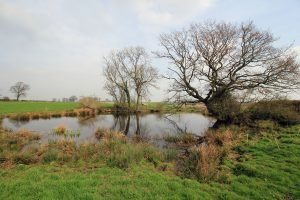Letter to Natural Capital Committee on small waters
2nd December 2020
Freshwater Habitats Trust with a group of the UK’s top freshwater scientists has today written to the Natural Capital Committee to call for urgent action on small waters.
Read the letter here. The last 20 years has seen a revolution in scientific opinion about which freshwater habitats are the most important for biodiversity. Today 20 of the UK’s most eminent freshwater scientists have written to Dieter Helm (Independent Chair of the government’s Natural Capital Committee), to call for urgent action to protect England’s smallest freshwater habitats: ponds, ditches, upland waters and headwater streams.
Traditionally, it was assumed that large habitats – rivers and lakes – were key. Recent science has turned this idea on its head: small sites have proved to be critical biodiversity hotspots and a vital refuge for rare wetland plants and animals1.
The concern raised by the scientists is that policy and legislation have not yet caught up with the science: small sites are largely omitted from monitoring programmes and there is little focus on, or funding for, their restoration and creation2.
This is both a problem and a missed opportunity.
There is worrying evidence that biodiversity in small sites may be declining faster than in larger waters3 caused by a mixture of pollution and poor management. Since tiny ponds and streams are often the only freshwater habitats in countryside landscapes, there is concern that their decline will lead to unprecedented loss of freshwater biodiversity on a landscape scale.
On the plus side, restoring small habitats offers major benefits: these sites pack a big bang for their buck: providing major biodiversity gains with only modest expenditure. Creating new clean water ponds, rewetting small fens and de-intensifying land around headwater streams are all cheap and effective options, bringing biodiversity benefits out of all proportion to size of these habitats.
For example, earlier this year it was found that adding just 20 new ponds in a 10 km2 area of farmland protected the entire area against loss of freshwater biodiversity, and brought back rare plant species that had not been seen for decades: https://www.bbc.co.uk/news/uk-england-leicestershire-52910464.
At a time when the Environment Agency admits that ALL rivers in England are degraded, and despite multimillion pound investment, river quality has flat-lined for over a decade, we urgently need better, quicker and cheaper solutions that protect freshwater wildlife. To counter the biodiversity crisis facing freshwaters scientists believe that small waterbodies could be an important part of that solution if their value is better recognised.
Dr Jeremy Biggs said: “This could be a win-win solution – for a fraction of what the government and water industry is spending now, we can reverse the inexorable decline of UK freshwater wildlife by focusing on small waters.
“And post-Brexit changes in legislation give an opportunity to set our own rules to protect freshwater by properly including small waters”.
Notes
- Surprisingly, in most landscapes where scientists have looked, ponds support more species collectively than other freshwater habitats. Key reference: https://www.sciencedirect.com/science/article/pii/S0006320703001538.
- Recently, European freshwater biologists have noted that ‘new strategies should address the bias in research, management, and policy principally focused on rivers and lakes, largely excluding other freshwater habitats’ (see: van Rees et al. 2020: https://conbio.onlinelibrary.wiley.com/doi/10.1111/conl.12771).
- Recent UK government evidence shows that river and lake quality has flat-lined over the last 10 years (see Indicator B7 here: https://jncc.gov.uk/our-work/ukbi-b7-surface-water-status/). In contrast, small waters still seem to be declining and, at a landscape scale, headwater streams are losing species (see /app/uploads/2019/05/NPS-resurvey-summary-results-1JB.pptx and https://www.sciencedirect.com/science/article/pii/S0006320719310626) .
Key facts about small waters
Although overlooked by previous generations of researcher and policy makers, small waters are the most numerous of freshwater habitats and are vital for freshwater biodiversity – at least as important as the big rivers and lakes on which most attention is focused. Key reference: Biggs, J., S. Von Fumetti and M. Kelly-Quinn (2017). The importance of small waterbodies for biodiversity and ecosystem services: implications for policy makers. Hydrobiologia, 793: 3-39.
In England and Wales – which has been at the centre of work uncovering the critical role of small water bodies – the total length of small streams (so called first and second order streams) is 126,338 km, or 73.4% of the total running water network. In England, Wales and Scotland, at least 98% of standing waters are ponds less than 2 ha in area (8,500 lakes, around 480,000 ponds in the rural landscape, outside of urban areas). Key reference: Riley, W.D., Potter, E.C., Biggs, J., Collins, A.L., Jarvie, H.P., Jones, J.I., Kelly-Quinn, M., Ormerod, S.J., Sear, D.A., Wilby, R.L. and Broadmeadow, S., 2018. Small Water Bodies in Great Britain and Ireland: Ecosystem function, human-generated degradation, and options for restorative action. Science of the Total Environment, 645, pp.1598-1616.

